Latest Contributions
Memorable and Useful Experiences as an IAS officer

I. C. Srivastava was born in 1943. A student of English Literature, he joined the Indian Administrative Service in 1966. During his 37 year tenure, he served as Collector/ District Magistrate of three districts, rising to the position of Chairman, Board of Revenue, Rajasthan.
Shri Srivastava worked as Secretary/Principal Secretary of as many as 17 Rajasthan State Departments, including Revenue, Irrigation, Education, Culture, Tourism, Sports, and Women & Child Development Department. He retired as Chairman, Rajasthan State Mines and Minerals Corporation.
Shri Srivastava has authored several books on Administration & Current affairs in Hindi and English. Nowadays, he is associated with various social and cultural voluntary organisations in Jaipur.
Life in IAS begins
As an IAS officer, one gets a chance, rather a host of opportunities to experience a number of unique situations. I have penned down a few memorable experiences which might be interesting and rewarding to readers, especially trainee administrative officers who may be confronted with similar or more challenging situations.
An officer faces numerous problems in the field, as Sub-Divisional Officer and early in career as Collector and District Magistrate. Thereafter, the officer is either posted as Deputy Secretary in the State Secretariat or as Head of the Department (HoD) in a state cadre unless one is seconded to a Central Government assignment quite early in career. In Secretariat and HoD postings, the officer gets to know the process of policy formulation and the role of various players.
Broadly, following this career graph I have culled some of my rich and intense experiences for the benefit of newly inducted administrative officers. However, quite a few events and situations including my experiences in three districts, namely, Barmer (1970-72), Sri Ganaganagar (1976-77) and Bharatpur (1977-78) as Collector and District Magistrate have been dealt with and narrated at length in two of my books: Challenge and Change in Administrative System (1999) and Bhartiya Prashasan: Parivartan Ki Chunotiyan (Hindi) (2004), the latter being an enlarged, revised and updated version of the earlier one. Therefore, here I will recount experiences not contained in the two above mentioned books.
Initial Training
It is with immense satisfaction and a modicum of pride I would like to state and clarify that having to migrate with my eldest brother way back in June 1955, from Allahabad, the day my high school result was declared I virtually became a ‘Rajasthan’ citizen at the early age of 12 years.
After completing my studies with a Masters in English Literature in the year 1961 from the then premier Maharaja’s (P.G.) College, Jaipur I had to wait in the wings as a lecturer at two government and three private colleges including BITS, Pilani before I was allowed to write papers for the Combined Civil Services Examination of October 1965, which was held immediately after getting over the trauma of the Indo-Pak war of 1965.
I prepared for the Civil Services Examination with black-outs at night besides simultaneously preparing for my teaching assignments during the day at Government College, Tonk. However, IAS examination results in April 1966 did not belie my expectations.
Joining the National Academy of Administration (now called L.B.S. National Academy of Administration) at Mussorie with great hopes and fears, I found myself managing and coping with a baffling variety in curricular and co-curricular activities Including oft varying timings of morning PT and afternoon horse-riding classes.
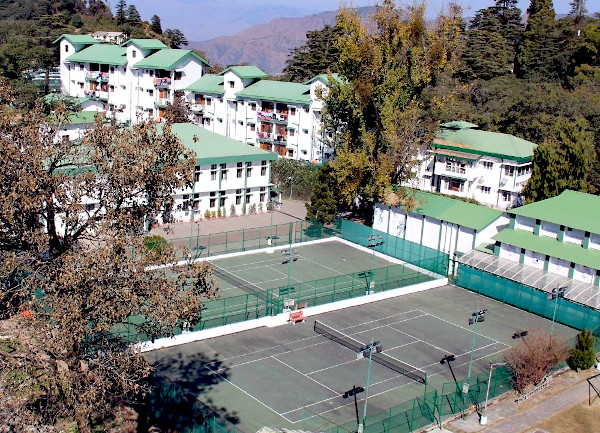
The play arena at the L.B.S. National Academy of Administration.
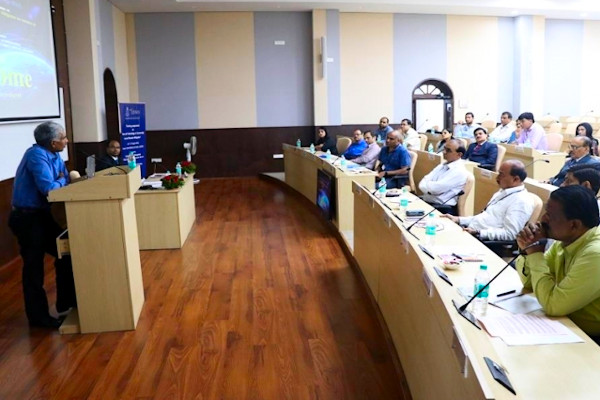
The training room at the modern L.B.S. National Academy of Administration.
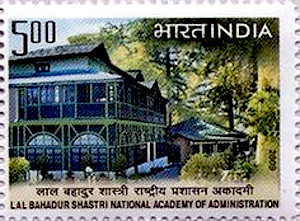
A postage stamp issued in the honour of L.B.S. National Academy of Administration.
Looking back, to say the least, and to sum up my experience of institutional training suffused us and our personality to the core and ingrained and inculcated a unique sense of rigorous discipline, punctuality and high morale. This coupled with core values of civil services neutrality and objectivity changed our outlook. Transparency and sensitivity became our watch words.
I recall two incidents to illustrate the important lessons learnt by us trainees popularly known as Probs. I vividly recall Nikhilesh Prasad (nick name ‘Nixie’), an IFS (Indian Foreign Service) fellow probationer leisurely walking up from his Happy Valley Club room to join the PT Group at 6.20 a.m. (varied timings were set for various groups for the wh ole week to inculcate punctuality). As ‘Nixie’ was about to join the PT square, he was stopped short by a horse-rider and ‘lo and behold’ our Director, the legendary Mr. M.G. Pimputkar, probably from the last surviving batch of ICS.
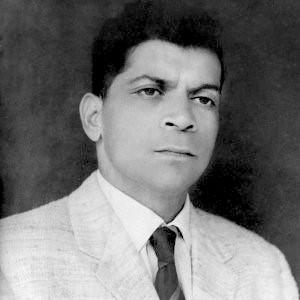
Mr. M.G. Pimputkar, former Director, L.B.S. National Academy of Administration.
‘Stop!’ he yelled. “You are late. You cannot join this Group. Meet me in my office at 3 p.m. in the afternoon.”
The Director did not stop to ask the name of the officer and trotted away on his horse for his morning exercise rounds. ‘Nixie’ thought that probably he had not committed any mistake but was given the unnecessary dressing down by the Director and also extraordinary leave on the second day of his entry in service, which became not only a talking point amongst the Probationers but also an object lesson for everyone to be punctual for all classes besides lunch and dinner timings.
Punctuality wore a mantle of sanctity so much that once our Deputy Director Senior (who rose to be Chief Secretary, Uttar Pradesh and later Secretary, Steel in Government of India) was shut out by the doorman who punctually closed the doors of our classroom and politely conveyed his inability to let the senior officer enter.
In another incident, the awesome and hallowed person Mr. Pimputkar conveyed to our group to wait outside his residence between 5.15 and 5.30 p.m. when he himself opened the door punctually to welcome us for a ‘formal’ afternoon tea with him. Of course, once inside, we were at home and relaxed with his story telling with great sense of humour. However, despite the near puritan atmosphere and Spartan lifestyle, we smelt the air of romance which prompted a few probationers to go for walks as duos and pairing by choice, which finally led to announcement of a few engagements just before the
training got over.
This made the farewell dinner a gala and memorable event.I can easily recall the speech made by the President, Mess Committee proposing a toast to the Director and to the newly engaged couples beginning with “Despite you and your rigorous discipline some of us managed to fall in love and therefore, it is with pleasure, I announce the engagement of three couples”. His speech was received with a thunderous applause and laughter.
Mr. Pimputkar responded humorously to congratulate the newly engaged couples. But his parting words still resonate in my mind: “As you leave the precincts of this training institution, one final word of advice I would like to give based on my own experience. I have seen 26 transfers in 27 years of service by now and I have never hankered after places or postings. Remember, if three of you can withstand the political pressures by resisting the temptation of postings and good places, the fourth colleague of yours will not be victimized”.
Alas, I could never count myself as the fourth officer having been made to resist political pressure on my own, which resulted in a mixed bag of 29 bad, good, better and so called best postings at various stages of my career with little or practically no regret except on account of having to undergo five postings in a period of two years, during the years 1976-78.
Academy training over, two of us (total being four) landed in Jaipur in the second week of July 1967 with renewed vigour after spending two weeks with an army unit near Naushera (Jammu) on the border with Pakistan.
We made the mandatory calls on the Chief Secretary who spent forty minutes instead of ten and other Senior Secretaries to Government. One of the Secretaries who took pride being a shikari but who was desperately short of time, while rushing out of his room advised us to “eat what we killed in the district” to which we were posted. It was a strange advice which we hardly ever followed. As a coincidence, I found in my second trainer-Collector at Ajmer, a shikari by hobby who found time to go hunting in the jungles close to places of his tour' which occasionally was fixed with an eye on hunting rather than any district related work .
He asked me to join him on a 'shoot'. I politely declined as I was keen to carry on with my training with other senior officers posted in the district. I enjoyed my interactions with these officers in the absence of DM.
My first collector and mentor Shri B. Hooja, was an outgoing, effusive and affectionate person who always enthused both of us [me and Shri Anil Kumar of 65 batch]. Mr. Hooja made it a point to pick both of us from the Dak Bungalow or residence to join him on tours.
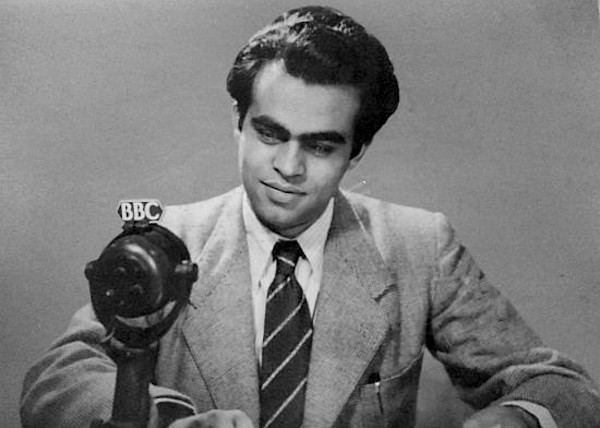
Shri B. Hooja, photographed during his stint with the BBC.
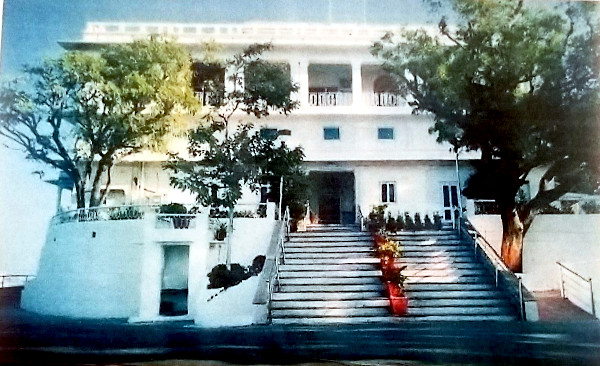
The Circuit House at Ajmer.
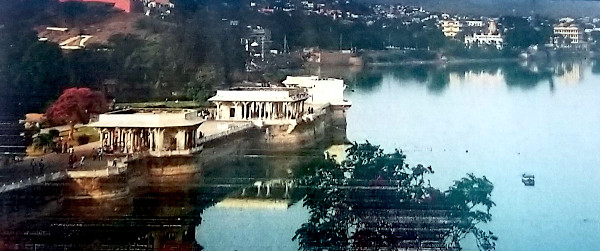
Anasagar Lake at Ajmer.
On one of the tours, he announced to us that he had conveyed to SDO concerned to get a good lunch prepared for his two ‘Rajkumars’. We felt elated and enthralled at this gesture.
To our dismay, he had to leave Ajmer within just two months, to take over as Commissioner and Secretary, State Enterprises, Government of Rajasthan. Although the sheen, aura and ardour of Academy training did not wear off easily, the field training did present an interesting contrast.
My first day experience on arriving at the Collectorate after one kilometer walk from the picturesquely located Circuit House, overlooking Ana Sagar Lake was somewhat like a jolt to the mind and memory.
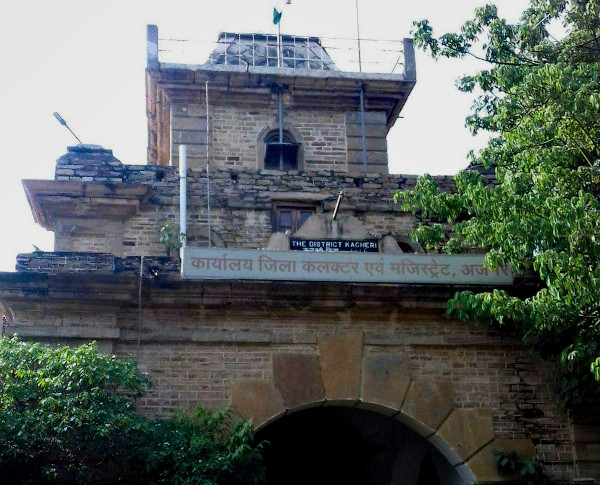
The Collectorate at Ajmer.
A lone, turbaned sweeper clad in khadi uniform was sweeping the floor at 10 a.m. when I entered the building. Looking around, I saw a burly, rather heavy bodied, bespectacled officious looking person walking into a room across Collector’s chamber. He was the Office Superintendent who timely advised me to go to the senior trainee officer’s quarter located behind Collector’s residence nearly a kilometer away from Collectorate. Apparently, Shri Anil Kumar my senior who was already aware of my arrival at Ajmer welcomed me with open arms. Though fully groomed by Mr. Pimputkar at the Academy, he gave me hints enough to be at ease and peace with myself. Friendship with him developed over the years lasted beyond our service days.
‘Jhandewali’ small room court below the high flying tri-colour national flag beckoned me from a distance and became my prize possession for more than a year after Shri Anil Kumar was posted out as Sub-Divisional Officer.
I went through the intensive block, tehsil and nominal settlement training besides disposing off court cases as Assistant Collector and Magistrate. Apart from a few revenue cases, I devoted time and energy mainly to learn the process of trial and disposal of criminal cases under Gambling, Motor Vehicles, Excise and Police Acts. Collectorate training also included functioning as sub-officer and officer-in-charge of various sections including Revenue, Transport, General, Nazarat, Record, Famine, Accounts, Development etc.
My next posting was as SDO, Bharatpur in October 1968. I shall recount my stay in Bharatpur in the next story.
Editor's Note: The second part of a series on life as an IAS officer is here.
Add new comment